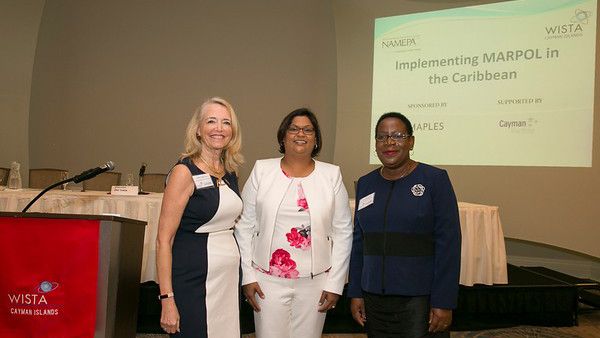MARPOL Implementation in Caribbean a Concern

Grand Cayman was the site of a pivotal conference on “Implementing MARPOL in the Caribbean” held on May 2nd under the auspices of WISTA (Women’s International Shipping and Trading Association) Cayman Islands and the North American Marine Environment Protection Association (NAMEPA). The event attracted subject matter experts in the field to develop a strategy for greater implementation of MARPOL (the IMO’s Marine Pollution prevention regulatory framework) in the region. The law firm, Maples and Calder sponsored the conference, which was supported by the Cayman Islands Shipping Registry.
While 86% the countries of the Caribbean have ratified MARPOL, only an average of 25% have implemented the legislation necessary to utilize and enforce MARPOL in the region. This makes the countries vulnerable to a maritime accident or event. It further makes operating in the region an uneven playing field to ship operators.
As observed by Maples and Calder partner, Sherice Arman: “All the right people to deal with this issue are in the room.” Colin Young from the IMO (International Maritime Organization), Claudia Grant of WiMAC (Women in Maritime Association-Caribbean), Commander Keith Donohue from RAC/REMPEITC, and Dr. Pauline Yearwood of CARICOM gave an overview of MARPOL, its importance, its history in the Caribbean and the extent of its adoption, along with the protocols for reaching governments to further its implementation. From the policy level, the conference moved to the practical utilization of MARPOL, along with the risks of non-compliance. This was followed by an in-depth view by Kierstan Del Valle from CLIA (Cruise Lines International Association) of how the cruise industry has embraced MARPOL in its practices, including its waste management policy that has been adopted by all CLIA members.
“This is a crucially important issue for the Caribbean, which relies heavily on both cruise and cargo shipping for its livelihood,” stated NAMEPA Co-Founder and Executive Director Carleen Lyden-Kluss. “The vulnerability of the region in the event of an accident or event cannot be overstated. Without MARPOL, and other instruments to protect the marine environment and commercial interests, a country’s entire economy and supply chain would be disrupted, resulting in tremendous financial and human loss without accountability or recompense. Governments need to address this critical need immediately.”
The tactical aspects of implementing MARPOL were addressed by industry service providers of emission and waste stream technologies, a guidance product on MARPOL regulations based on location, and a waste management program designed to support ship owners and countries with support.
Education was a key theme of the event. Dr. Fritz Pinnock of the Caribbean Maritime University presented the many offerings for training at the CMU, as well as the potential to establish a MARPOL Training Centre at the University. Stephan Nanan of the University of Trinidad and Tobago discussed the Maritime Technology Cooperation Centre Caribbean addressing greenhouse gas emissions.
The conference concluded with a roundtable discussion designed to identify pathways forward which included mobilizing industry, reaching out to governments with economic data, educating the public about the maritime industry and the need to protect the marine environment, and creating a training center for MARPOL education of Caribbean citizens.
The conference, “Implementing MARPOL in the Caribbean” was part of Cayman Maritime Week which served to highlight the benefits of the Cayman Islands Shipping Registry as well as tax neutral opportunities to establish a corporate presence in Cayman.
The products and services herein described in this press release are not endorsed by The Maritime Executive.
